How much weight should a poor conclusion have in the final analysis of an otherwise well-executed series? Should you take a mathematical approach, calculating which percentage of its episodes didn’t meet an average standard of goodness? Or should you work based on feelings – the degree to which your memory of the show is stained by a lousy ending? Personally, I’d say that either method is fine, so long as you factor in the strength of the series before its implosion. In Yesterday wo Utatte’s case, its first 11 episodes were better than its finale was bad. That schizophrenic bus monologue and badly-timed confession can’t erase the heartache of Shinako’s backstory, or the show’s excellent supporting character work, or its vivid sense of nostalgia. This is an anime that stood atop the spring season for most of its run, then punted its crown in week 12. That doesn’t mean it joins Shachou, Battle no Jikan desu! and Shadowverse at the bottom of the seasonal barrel; it just moves down a couple spots on the winner’s podium.
If there’s a single element of Yesterday wo Utatte that placed it on that podium to begin with, it’s the show’s characters. That may read as an strange claim in the wake of a destructive finale, but consistency of choice isn’t the only thing that goes into shaping a character. That’s especially true of hand-drawn animation, where teams of artists are responsible for the smallest and most intimate movements on screen. Yesterday wo Utatte excels in this facet of characterization, delivering shifting postures and facial expressions that add emotional nuance to many scenes per episode. Incidental cuts like Rou stepping out of his shoes or Shinako lifting a corded phone to her ear are depicted with a full range of motion, which creates the sense that even the little moments matter. We’re not talking One Punch Man levels of fluidity here, but Yesterday isn’t that kind of anime. It’s about short conversations, one after another, that when taken together comprise the ordinary, complicated lives of a young adult cast.
Two of my favorite members of that cast appeared in one episode apiece, those being “The Man Named Minato” and “The Woman Named Yuzuhara.” Though they were introduced as figures from Haru and Rikuo’s romantic pasts, respectively, the series lent them startling amounts of detail in just twenty minutes each. Minato’s straightforwardness and Yuzuhara’s thoughtful rebellion were depicted so smartly that they left a major impact on me. The former paved the way for Haru’s increasing honesty throughout the show, while the latter’s lack of attachments made her a perfect foil for an increasingly social Rikuo. While both were great supporting players, the show’s MVP was probably Shinako, whose grief at the death of a former flame kept her emotionally suspended in time. Her romantic storyline frustrated me towards the end of the anime, but it’s impossible to deny the depth of her sadness as Yesterday first laid it out, blurring the line between past and present in her memory.
Not every character here is a star, though, a fact which unfortunately extends to Rikuo, the series’ protagonist. Viewed from a distance, his arc looks pretty good: loner with a dead-end job rekindles old friendships, finds new work, starts seeing an old college crush, realizes the relationship isn’t working, then has a minor breakdown on a public bus and pivots to the next available female. Even if we omit that last bit, though, Rikuo is kind of a mess. He’s voiced with a weird combination of sullenness and bluster by Chikahiro Kobayashi, who did much better work last year as Beastars’ Legosi. His lack of transparency causes the plot to take some odd turns, and when you examine the photography gig he gets midway through the story, you realize it’s just window dressing – we learn almost nothing about him as a result of that job. By contrast, teenage artist Rou’s struggle to gain admission to his desired college demonstrates his talent and tenacity (even if that second trait lands him in hot water elsewhere).
Yesterday’s tendency to skip chunks of time doesn’t do its plot any favors, either. The first three months of Rikuo and Shinako’s relationship were leapfrogged in an attempt to reach a particular stopping point, and while their mutual attraction was clear beforehand, their initial stabs at intimacy were not adequate preparation for the domesticity that followed. Haru was sidelined during this entire process, and the show failed to elaborate on her character’s hazy past and personality quirks, leaving her less than three-dimensional. And then there’s the series’ mad dash to the finish line, the lameness of which I covered during the second half of this post. When significant issues can be raised regarding all three members of a love triangle, you know that the story surrounding them is far from airtight. But honestly, an airtight story wasn’t what this character piece needed. All it required was catharsis, and it still missed the mark.
So, did Yesterday wo Utatte trip and fall on the way to a season-ending layup? Yeah. Was its protagonist a bit of a wet blanket even before that point? In my opinion, yes. But for every issue I took with the series as it concluded, I can find two things to appreciate about it in retrospect. The motif of characters with their backs to the lens, staring into an uncertain future, was a tremendous visual unifier for their differing insecurities. The show’s gently-plucked acoustic guitar and piano lines created a wistful musical rhythm, but it still found time for silence during particularly dramatic passages. A natural color palette kept the story firmly rooted in reality, with blurring effects applied only in those same silent moments. Even the spaced-out moments of humor worked for me, down to the anime’s final moments, when Shinako stared in horror at the pretty college girl who answered Rou’s doorbell. That shit had me laughing through my disappointment.
In the end, that silly scene works as a metaphor for Yesterday wo Utatte as a whole. Even when it made a bad decision, it was sure to bounce back with an appreciable moment of humor, angst, or wisdom. Even when the characters were stuck in holding patterns, they were recognizably human. Even if a few backgrounds seemed like photographs with filters slapped on top (looking at you in particular, grocery store from episode 11), most of them were quite nice to look at. It wasn’t perfect, but it was pretty good, and that’s more than most anime from this or any era can boast.

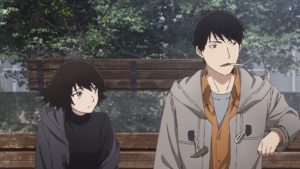
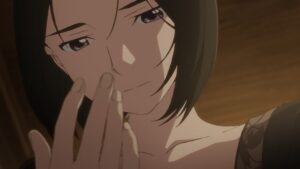
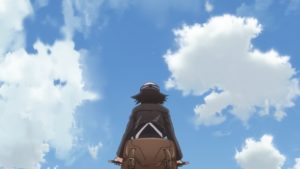
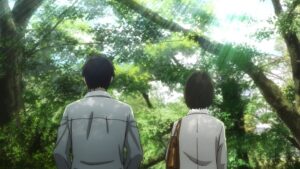
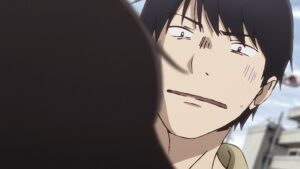
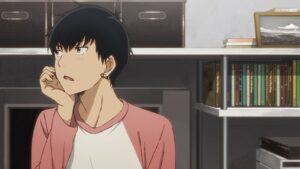
I watched the first 6 episodes pretty much the day they aired but somehow never found the time to watch the remaining 6 episodes until now. Since I thought the first 6 eps were rather well done I was kinda shocked when I read that it pretty much crashed and burned torwards the end. I was imagining all kinds of shitty conclusions but in the end while I was dissapointed to a certain degree I wasn’t that bothered by it. As you said the majority of the show was well executed and delivered some exceptionally emotional and melancholic scenes, therefore I simply couldn’t bring myself to really hate the show. While the ending was flawed and most importantly extremely rushed it kind of fitt the flawed characters in the show. I feel like I could live with the ending even better if it was build up properly and slowly like the rest of the show, but calling the show a dumpsterfire like so many others on the internet would be completly ignoring the (at least in my opinion) solid 11 episodes before the last dissapointing one.